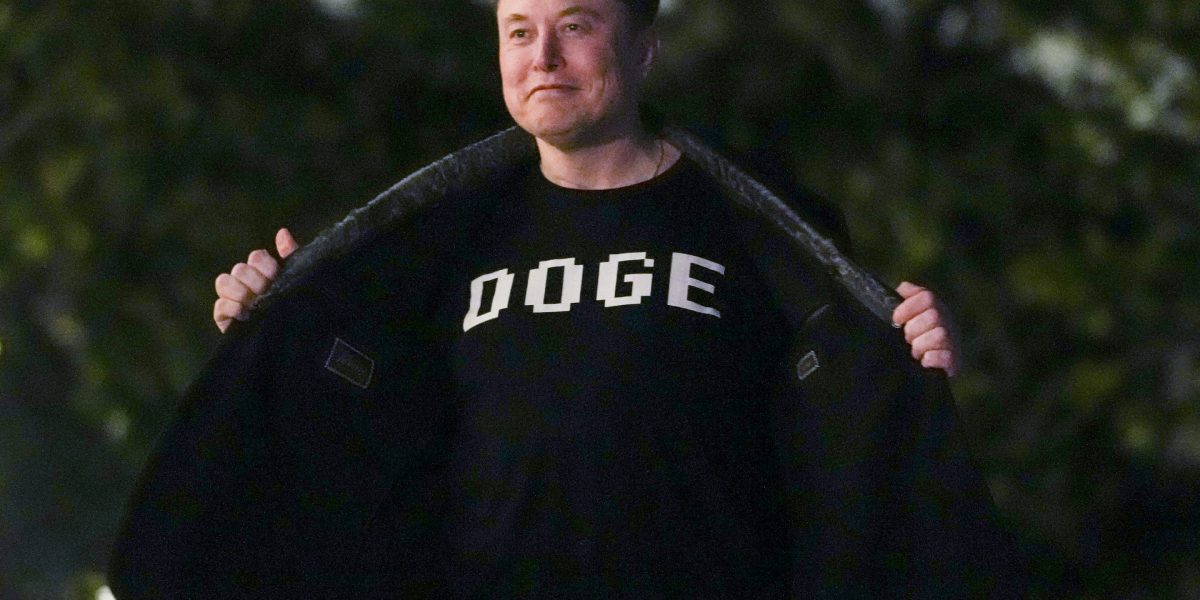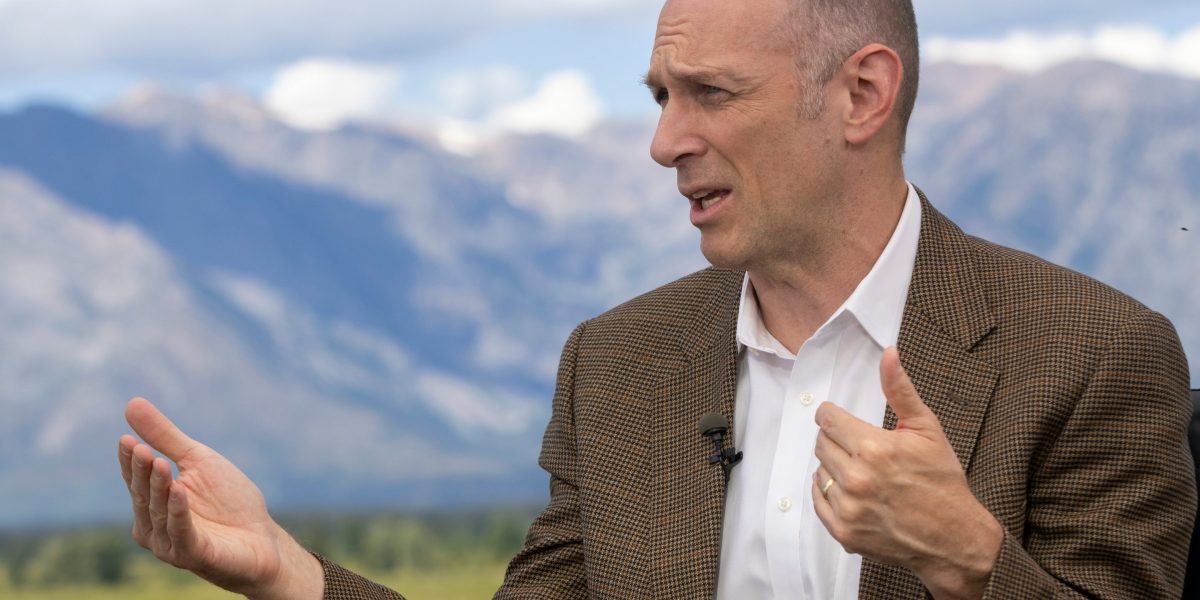In her 28 years working for the federal government, Shea Giagnorio provided day care for the children of U.S. soldiers, training for employees and oversight for safety net programs.
Public service took her from Germany to Alaska to Kansas City, Missouri, where she moved last year for a long-sought promotion.
But when she reported to a downtown federal building for work one day last month, her access card did not work. After a co-worker let her into the building, she checked her email: Her entire office had been let go in the latest mass firing ordered by President Donald Trump’s administration.
The 46-year-old single mom has canceled her apartment lease, is selling her new furniture and may have to pull her daughter out of college. She wonders what will happen to the at-risk populations her team helped serve at the Administration for Children and Families, a part of the U.S. Department of Health and Human Services.
Barrage of cuts hit Kansas City
“Not only me, but all these peoples’ lives are turned upside down,” Giagnorio said.
The impact of the cuts by Trump appointees and Elon Musk’s Department of Government Efficiency can be found everywhere in the Kansas City metropolitan area, which has long been a major hub for federal agencies about 1,000 miles away from Washington, D.C. Money once promised to the region for public health, environmental, diversity, food aid and an array of other programs has been axed, and thousands of local jobs are in jeopardy.
With nearly 30,000 workers, the federal government is the largest employer in the region. One longtime Kansas City economic researcher said he believes the region could lose 6,000 good-paying federal jobs, which in turn would wipe out thousands of others in service industries.
An IRS worker said thousands of her coworkers fear they will lose their jobs, even as they put in overtime processing tax refunds in a building so crowded that they struggle to find desks. Under pressure, hundreds more agreed this week to retire early or take a buyout.
A U.S. Department of Agriculture grant revocation disrupted a historically Black neighborhood’s plan to expand its program growing fresh produce in a food desert. A nearby pantry reduced its monthly grocery allotment for those in need after federal cuts left food banks shorthanded.
The withdrawal of federal funding for new lab equipment and vaccines means the city may be less prepared for the next pandemic.
A landlord may have to sell an office building for a loss after his federal tenants were among several that abruptly canceled local leases, adding a glut of real estate to the market.
And the city’s Tesla showroom has become a spot of weekly protest. Activists are seeking to have it closed by pushing a referendum intended to drive Musk’s electric car company out of Missouri.
HHS: Cuts to service for low-income families
The nation’s health department is slashing its full-time national workforce from 82,000 to 62,000. Among them were Giagnorio and her colleagues in her agency’s 10 regional offices around the country that helped deliver services through programs such as Head Start and emergency assistance for low-income families.
“The poor will become even more poor now,” Giagnorio said. “If we’re taking away social safety nets, what is the end result? If we’re not helping homeless people anymore, will they freeze to death in the winter? Is that what we want?”
Giagnorio, who spent most of her career as a U.S. Department of Defense civilian employee at bases in Germany and Alaska, is on paid leave until her June 2 termination. She wasted no time looking for another position after being locked out of her office, visiting a job fair hours later that Kansas City hosted for displaced federal workers.
But she doubts she will be able to find a public sector salary anywhere near the $117,000 she made and doesn’t know how her skills translate to the private sector. She worries about losing the health insurance that covers her family and having to pull her daughter out of Maastricht University in the Netherlands after her first year.
For now, she can’t get any answers from the agency to basic questions about her financial future. Does she still qualify for an early retirement buyout offer that had been extended? How much would she receive and when?
IRS: A rush to Tax Day, then layoffs and buyouts
The days leading up to the April 15 tax filing deadline were always going to be busy for workers at the IRS processing center near Union Station, but this year, they were particularly stressful.
The IRS is considering a downsizing that could cut as many as 20,000 employees, or 25% of its workforce, in the coming weeks. The roughly 6,000 employees in Kansas City faced agonizing choices: decide whether to accept resignation or early retirement offers by April 14 or risk losing their jobs later.
“It’s a kick in the stomach to people that are doing everything they can to meet what’s required of them,” said Shannon Ellis, a longtime IRS customer service representative and president of the union representing local workers.
By Thursday, at least 238 Kansas City workers had taken the buyout offers and were expected to leave the agency in coming weeks. Ellis noted many of those same workers had been told they were essential and required to work overtime during tax season, some seven days per week.
Their building has been overcrowded since the IRS ordered remote employees back to the office in March. Workers sometimes struggle to find open desks. Some have to bring their own ink pens and share date stamps to perform basic job functions after budget cuts have depleted supplies.
Ellis said IRS workers share the public’s disdain for taxes but understand that collecting them is necessary to support important programs like Social Security. She said she’s decided to take a “roll of the dice” and stay in her job, spurning an early retirement offer.
“I love my job,” she said. “I’m not going to let the bully force me out.”
USDA: An urban food desert loses help
Urban farmer Rosie Warren grew 2,500 pounds of fruits and vegetables last year in community gardens to help feed the Ivanhoe neighborhood, where many Black families were concentrated under housing segregation policies of much of the 20th century.
Warren harvested greens, potatoes and watermelons as part of an effort to address food insecurity and health concerns in a neighborhood challenged by blight, crime and poverty. She was ecstatic last fall when the USDA awarded the neighborhood council a three-year, $130,000 grant to expand the gardens and farmers’ market serving the area.
Plans called for hiring an assistant to help Warren with growing more food and to add another market day aimed at serving more low-income older adults, mothers and children.
In February, the council received a notice terminating the grant. The USDA had determined the award “no longer effectuates agency priorities regarding diversity, equity, and inclusion programs and activities.”
On a recent morning, Warren took a break from preparing the soil for planting to ponder the USDA’s decision.
“What do you do if you don’t support providing access to food to people who don’t have it? Wouldn’t this make your job easier?” she said. “I think it’s absurd. It doesn’t make any sense.”
Other food aid in the neighborhood has taken a hit at a time when demand is rising.
At the Bishop Sullivan Center food pantry, hundreds of low-income families are getting fewer groceries in their monthly pickups after USDA halted $500 million worth of deliveries to food banks. That included a planned order for 41,000 cases of meat, dairy and other commodities to a bank serving Kansas City.
“It just means giving families less food,” said pantry director Christopher Lowrance, who said he’s able to provide less chicken and other meat products. “It’s as simple as that.”
Public health: The city lab misses a needed upgrade
The Kansas City Health Department’s laboratory is badly in need of an upgrade, with equipment dating to when the building opened in the 1990s.
One basement space is water damaged and rarely used. Another has equipment that is so inadequate that the city has to ship samples to a state laboratory 150 miles away, causing inefficiencies, agonizing waits for results and delayed response times.
Kansas City’s health director, Dr. Marvia Jones, made it a top priority to modernize the labs this year after studying their response to the COVID-19 pandemic. Her agency planned to use federal funding to purchase new microscopes and testing equipment.
“That early disease detection allows you to do more rapid intervention, more rapid treatment, more rapid isolation,” she said.
But the funding for lab upgrades was abruptly eliminated last month as part of the Trump administration’s $11.4 billion cancellation of federal grants to states for public health. That news “crushed” the department’s carefully laid plans, Jones said.
Jones said the cuts, $3 million and counting for her department, mean the city will also have fewer vaccines to administer to low-income residents.
“It would be a sad shame for us to be in a worse position than we were before the pandemic,” she said. “We had processed all of our lessons learned, and then now this happens.”
Real estate: A landlord considers selling his building
Amir Minoofar was surprised when two federal agencies notified him that they planned to vacate the office building he’s owned for a decade in Overland Park, Kansas, a suburb of Kansas City.
Minoofar said the Occupational Safety and Health Administration had recently agreed to extend its lease until 2029. The National Labor Relations Board, meanwhile, was paying month to month.
Minoofar said the government initially notified him the agencies would be out of the building in August, part of a DOGE-led blitz of hundreds of lease cancellations that has been marked by errors and subsequent reversals.
In the Kansas City metropolitan area, the government is moving to cancel 10 leases totaling 219,000 square feet that cost more than $4 million in annual rent, according to DOGE’s online “Wall of Receipts.”
Minoofar said he was more recently told the agencies will likely have to stay past August and their departure date is now unclear. He said he may have to sell the building, which has an appraised value of $2.9 million, and take a loss because of the difficult office market.
But he said he understands why the government would unload the space, which he said has often been sparsely used since the rise of telework during the pandemic.
“Businesswise, it makes sense for government to cut costs,” he said. “A lot of people are going to be unhappy but it’s a huge gigantic family and they need to take care of it. You cannot keep everybody happy.”
Tesla: Elon Musk’s car company faces a statewide campaign
With liberal anger growing at Musk’s role in the government, protesters have gathered Saturdays outside his Tesla dealership in Kansas City to denounce the cuts.
State records show Tesla sales there have dropped amid calls for a boycott. Now, enough voter anger could even force the business to close.
Organizers of a newly launched “Unplug Musk” initiative are seeking to use democracy to strike at the world’s richest man by changing state law to ban car manufacturers from selling directly to consumers.
They say they plan to soon begin gathering the 111,000 signatures of registered voters that they would need to put the change on the statewide ballot in November 2026. If approved by voters, it would force the closure of the Tesla showrooms in Kansas City and St. Louis.
Missouri’s governor, Republican Mike Kehoe, a former auto dealer himself, sponsored a 2014 bill when he was a state senator aimed at requiring manufacturers like Tesla to sell through local dealers. The bill passed the Senate but died in the House after Tesla lobbied against it. The referendum revives that plan.
“There’s not a soul in this country who’s against trying to weed out government inefficiency but just taking a chain saw to people’s lives and their health care is a ridiculous way to achieve that. And it is going to cause some devastating impacts,” said organizer Brad Ketcher, a prominent Democrat and lawyer who helped draft the state’s 2022 marijuana legalization referendum.
The administration’s response: Temporary hardship
An HHS spokesperson said the agency’s downsizing, including cutting jobs and consolidating divisions, would save money and make the organization more efficient. As for the $11.4 billion in grant funding cuts, the spokesperson said, “HHS will no longer waste billions of taxpayer dollars responding to a nonexistent pandemic that Americans moved on from years ago.”
The IRS has offered a similar rationale for its downsizing, saying it is making process improvements that will ultimately more efficiently serve the public.
Musk said last year that Trump’s budget cuts would cause a “temporary hardship” that would soon put the economy on stronger footing.
One local economic researcher said it remained unclear just how deep that hardship will be in Kansas City, including whether it will just slow growth or cause population losses.
“It’s a big burden that’s being placed on a narrow group of people,” said Frank Lenk, director of the Office of Economic Development at the Mid-America Regional Council, a nonprofit of city and county governments in the Kansas City region. “It will definitely take some of the steam out of the local economy.”
Trump has credited DOGE with helping end “the flagrant waste of taxpayer dollars,” saving billions to help improve the nation’s finances.
The White House didn’t respond to questions about Kansas City. But Trump said recently he would invite the Kansas City Chiefs to the White House to make up for a 2020 Super Bowl victory celebration that was canceled during the pandemic.
—
Associated Press writer Heather Hollingsworth contributed to this report.
This story was originally featured on Fortune.com
Source link


 Entertainment8 years ago
Entertainment8 years ago
 Politics8 years ago
Politics8 years ago
 Entertainment8 years ago
Entertainment8 years ago
 Entertainment8 years ago
Entertainment8 years ago
 Tech8 years ago
Tech8 years ago
 Tech8 years ago
Tech8 years ago
 Tech8 years ago
Tech8 years ago
 Politics8 years ago
Politics8 years ago






